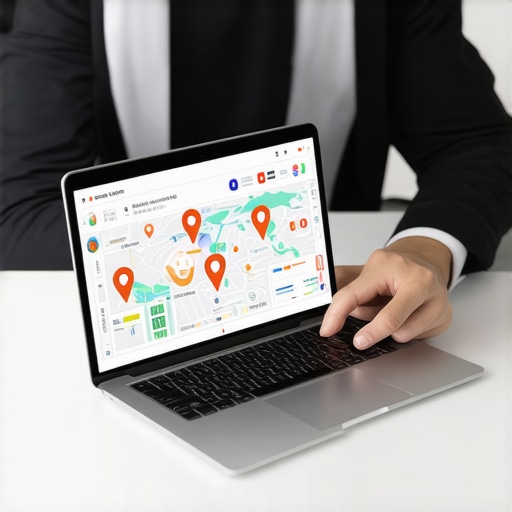My Journey into Local SEO: From Beginner to Expert
As a small business owner, I vividly remember the days when my local visibility was almost nonexistent. I knew I had a great product, but without proper local SEO strategies, my potential customers couldn’t find me. That changed when I started exploring effective local SEO techniques, and it was a game-changer. Over the past few years, I’ve learned that mastering local SEO is essential for boosting visibility and driving more foot traffic or local inquiries. Today, I want to share some personal insights into the top local SEO strategies that can transform your business in 2024.
Why Local SEO Is the Heart of Small Business Growth
In my experience, local SEO isn’t just about ranking higher on Google; it’s about connecting with your community and establishing trust. Local search optimization includes everything from Google My Business (GMB) profiles to local citations and reviews. I found that focusing on these elements collectively enhances my local rankings and builds credibility. As Reputation SEO suggests, your online reputation is your most valuable asset in local marketing.
My Personal Top Tips for Dominating Local Search in 2024
How Can I Leverage Local Keywords Effectively?
One of the first things I did was optimize my website with local keywords that my customers would naturally search for. Incorporating city names and neighborhood-specific terms into my content and meta descriptions helped me appear in local search results. I also made sure my NAP (Name, Address, Phone Number) was consistent across all online directories. These small but powerful steps significantly improved my local visibility.
Building Trust and Authority: My Secret Sauce
Trust is everything. I invested time into gathering genuine reviews and responding to every single one. I learned that reviews boost local rankings and influence potential customers. For deeper insights, I often refer to authoritative sources like SEO agency techniques that focus on reputation management and authority building. This holistic approach has helped me stand out from competitors.
What Are the Common Pitfalls to Avoid in Local SEO?
In my journey, I’ve seen many small businesses fall into traps like neglecting mobile optimization or ignoring local reviews. These mistakes can harm your rankings and reputation. Regularly auditing your online presence and staying updated with the latest SEO trends is crucial. For instance, Google’s local algorithm updates in 2024 emphasize user experience and relevance, so adapting to these changes is vital.
Join the Conversation: Share Your Local SEO Wins and Challenges
If you’ve implemented any of these strategies or have your own tips, I’d love to hear about your experiences. Comment below or connect with me through Contact. Remember, local SEO is an ongoing journey, but with persistence and smart strategies, your business can thrive in 2024 and beyond.
Unlocking the Power of Local SEO in 2024: What Are the Advanced Techniques?
As I delve deeper into the evolving landscape of local SEO, I realize that staying ahead requires more than just basic optimization. Advanced tactics, like leveraging schema markup for local businesses or integrating AI-driven insights for keyword research, can significantly elevate your search rankings. These strategies help search engines better understand your business context and deliver more relevant results to your local audience. For example, implementing structured data can enhance your local listings with rich snippets, making them stand out in search results. To explore more about these cutting-edge techniques, check out advanced local ranking tactics.
How Can Reputation Management Influence Your Local SEO Success?
Building a strong online reputation is the cornerstone of local SEO. I found that actively managing reviews, responding promptly, and encouraging satisfied customers to share their experiences can drastically improve your visibility and credibility. Google’s algorithms favor businesses with positive reviews and consistent NAP data across directories. Moreover, integrating reputation signals into your overall SEO strategy can help cement your position as a trusted local authority. According to Reputation SEO trends, this focus on trust and authority is only set to grow in importance, making reputation management an essential component of your 2024 strategy.
What Are the Practical Steps to Ensure Local SEO Efforts Are Measurable and Effective?
Tracking your progress is vital. From monitoring local keyword rankings to analyzing traffic sources and conversion rates, every effort should be data-driven. Using tools like Google Analytics and Search Console, coupled with local SEO platforms, enables you to identify what’s working and where adjustments are needed. I recommend setting clear KPIs aligned with your business goals—whether that’s increasing foot traffic, calls, or online inquiries. For a comprehensive approach, consider consulting with an SEO expert who can help you interpret data and refine your tactics. For more insights on optimizing your local campaigns, visit local SEO optimization tips.
Why Is Content Localization Critical for Dominating Local Search?
Creating localized content that resonates with your community can dramatically improve your local search presence. Sharing stories about local events, participating in community initiatives, or highlighting customer success stories establishes a connection that search engines recognize as relevant. I’ve seen firsthand how content that reflects local culture and language boosts engagement and rankings. Incorporating keywords naturally within these stories further helps to attract targeted local traffic. To deepen your understanding, explore top local ranking tips for 2024.
Join the Conversation: What Are Your Most Effective Local SEO Strategies?
If you’ve experimented with any of these advanced tactics or have unique insights, I invite you to share your experiences. Comment below, or connect with me through contact. Remember, mastering local SEO is an ongoing process, and staying informed about the latest trends and techniques can make all the difference in achieving long-term success.
How Do I Navigate the Nuances of Local Schema Markup to Stand Out?
One of the most overlooked yet powerful tools in my arsenal has been structured data schema markup. When I first started implementing schema for my business, I noticed a subtle but consistent improvement in how my local listings appeared in search results, often with rich snippets that grabbed attention. The key is understanding that schema helps search engines interpret your content more precisely, which can lead to enhanced visibility through star ratings, event details, or menu listings. For example, adding localBusiness schema with accurate contact info and operating hours can communicate trustworthiness and relevance directly to Google. To deepen this impact, I combined schema with advanced tactics from leading SEO agencies, ensuring my local presence is both comprehensive and optimized for rich results.

Image prompt: A detailed infographic showing schema markup implementation steps for local businesses, emphasizing enhanced search result appearance.
What Are the Subtle Signs That My Reputation Management Strategies Are Working?
Building a positive reputation isn’t just about accumulating reviews; it’s about cultivating trust and authority over time. I started noticing that my efforts to respond promptly and authentically to reviews led to a natural increase in positive feedback and customer engagement. These subtle signs included improved local rankings, higher click-through rates from local search results, and a more robust online presence even during competitive seasons. According to Reputation SEO trends, these signals of trust and engagement are increasingly weighted by Google’s algorithms, especially in local search. Reflecting on this, I realized that reputation management is a long-term investment—one that requires patience, consistency, and genuine interaction. I encourage you to analyze your review response rates and engagement patterns to gauge your progress beyond just star ratings.
How Can I Use Data to Fine-Tune My Local SEO Campaigns Effectively?
Data has become my compass in navigating local SEO. Through tools like Google Analytics and Search Console, I track everything from keyword rankings to user behavior on my site. For instance, I noticed that certain neighborhood-specific keywords performed better when I tailored my content to highlight local community events and stories. This insight prompted me to develop a localized content strategy that resonated more deeply with my audience, ultimately improving my rankings and conversions. The trick is to set clear KPIs—whether it’s increasing foot traffic, online inquiries, or sales—and regularly review these metrics to identify what’s working and what’s not. I also recommend exploring specialized local SEO platforms that provide granular insights into your market. For more comprehensive guidance, I suggest reading strategic local SEO tips to refine your approach continuously.
How Can I Leverage Schema Markup to Amplify My Local Presence?
Implementing structured data schema markup has been a transformative step in my local SEO journey. When I first integrated schema, I observed subtle yet consistent improvements in my search listings, notably through rich snippets featuring star ratings, event details, or menu highlights. This enhancement not only increased visibility but also built immediate trust with potential customers. According to Moz’s comprehensive guide on structured data for SEO, schema markup acts as a direct communication channel with search engines, clarifying your business details and offerings. For local businesses aiming to stand out, mastering schema is no longer optional but essential. I recommend starting with localBusiness schema, ensuring your contact info, operating hours, and services are accurately marked up, then progressively layering in more specific schemas relevant to your niche.

What Are the Subtle Signs That My Reputation Management Strategies Are Working?
Beyond the obvious increase in reviews, I’ve noticed nuanced indicators that my reputation efforts are bearing fruit. One such sign is a rise in organic click-through rates from local search results, which correlates with more compelling and trustworthy listings. Additionally, during competitive seasons, my business maintains or improves its ranking stability, indicating that Google recognizes my brand’s authority. The long-term engagement with customer reviews, especially responding authentically and consistently, fosters a loyal community that advocates for my brand. An insightful read on this is Reputation SEO strategies, emphasizing that reputation signals are increasingly weighted in local search rankings. Monitoring these subtle signs allows me to refine my approach continually, ensuring my reputation management remains impactful and aligned with evolving algorithms.
How Do I Use Data to Perfect My Local SEO Campaigns?
Data-driven decision-making has become the cornerstone of my SEO success. I leverage analytics platforms like Google Analytics and Search Console to dissect user behavior, source of traffic, and engagement metrics. For instance, I discovered that specific neighborhoods responded better to localized storytelling, prompting me to craft targeted content that truly resonates. Setting clear KPIs such as increased foot traffic, online inquiries, or conversion rates helps me measure progress with precision. Moreover, exploring niche tools like BrightLocal or Whitespark provides granular insights into local rankings and citation accuracy. For an in-depth understanding of optimizing these efforts, I recommend consulting strategic local SEO tips. Continuously analyzing and adjusting based on data ensures my campaigns stay agile and effective in the competitive local landscape.
Things I Wish I Knew Earlier (or You Might Find Surprising)
The Power of Local Reviews
Early in my journey, I underestimated how much genuine reviews could influence my local rankings. Responding authentically to reviews not only improved my reputation but also boosted my visibility in local searches. I realized that reviews are like social proof that search engines heavily weigh in their algorithms.
Consistency Is More Than Just NAP
While I focused on NAP consistency, I discovered that keeping my business information uniform across all platforms also includes category tags, service descriptions, and images. This holistic consistency helps search engines trust your listings more.
Mobile Optimization Is Non-Negotiable
One of my biggest mistakes was neglecting mobile responsiveness. Once I optimized my website for mobile devices, my local bounce rates decreased, and my local rankings improved noticeably. It’s the user experience that truly makes the difference.
Local Content Is More Than Keywords
Creating content that genuinely reflects my community’s culture and events helped me connect more authentically with local customers. This local storytelling boosted engagement and made my SEO efforts more effective beyond just keyword stuffing.
The Hidden Impact of Schema Markup
Implementing schema markup felt technical at first, but the rich snippets it generated made my listings stand out. I saw an increase in click-through rates, which translated directly into more foot traffic.
The Long Game of Reputation Management
Building a positive reputation isn’t quick, but the subtle signs—like increased click-through rates and more organic reviews—confirmed I was on the right track. Patience and authentic engagement are key.
Data-Driven Adjustments Are Essential
Regularly analyzing local SEO data helped me identify what strategies truly moved the needle. Tools like Google Analytics and local ranking trackers became my guiding lights, allowing me to refine my approach continually.
Resources I’ve Come to Trust Over Time
- Google’s Local SEO Starter Guide: A comprehensive resource that covers the fundamentals and latest updates. I revisit it often for best practices.
- BrightLocal Blog: Their expert insights and case studies helped me understand what’s working in real-world scenarios.
- Moz’s Structured Data Guide: An essential read for mastering schema markup and rich snippets, which gave my listings a competitive edge.
- Search Engine Journal: Staying updated with their articles keeps me informed about algorithm changes and new tactics.
Parting Thoughts from My Perspective
Mastering local SEO is a journey filled with surprises and learning curves. My biggest takeaway is that authenticity and consistency—both in online reputation and technical setup—are what truly drive results. Whether you’re just starting or looking to refine your strategy, remember that local SEO is about building trust with your community and search engines alike. If this resonates with you, I’d love to hear your thoughts. Share your experiences or ask questions in the comments, and let’s grow our local businesses together!
